Social Work News
Reimagining Falk College
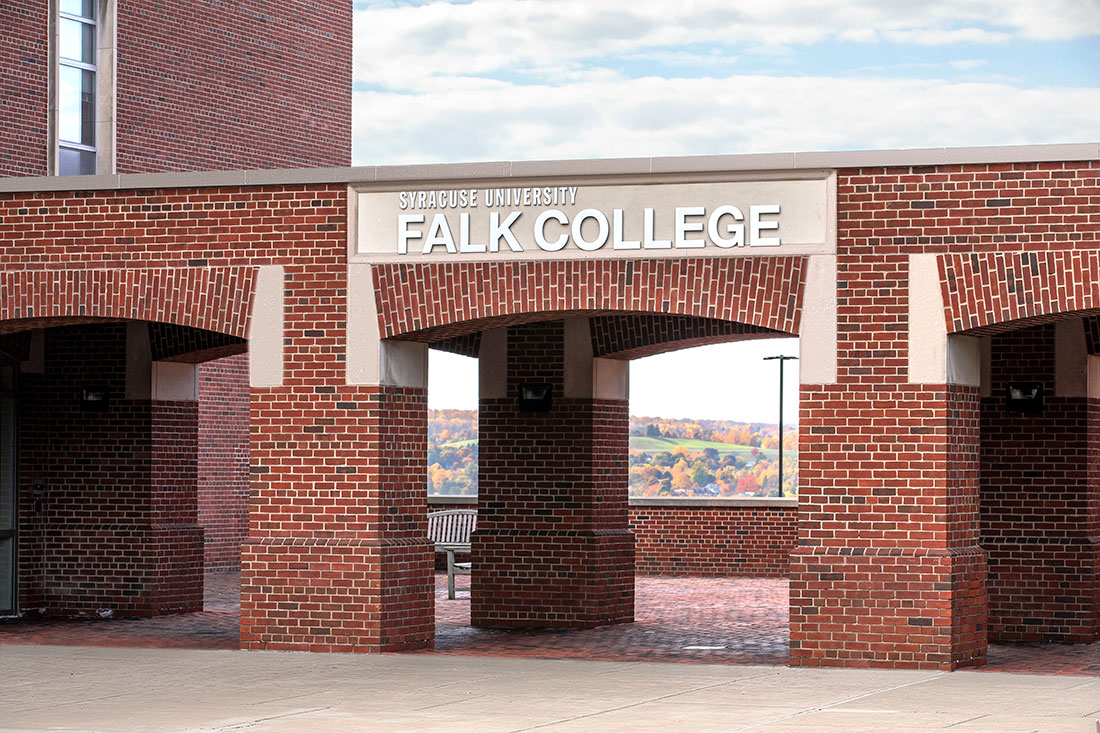
Two decades after the launch of its sport management program, Syracuse University today announced that as a result of its significant growth and academic excellence, the David B. Falk College of Sport and Human Dynamics will become the David B. Falk College of Sport. The first-of-its-kind college will focus exclusively on sport-related disciplines, making the University among the leading academic institutions for preparing students to drive innovation among and lead in sport-related fields and industries.
“Falk College has experienced extraordinary growth, particularly in its renowned sport management program, over the last 20 years, thanks in large part to its innovative faculty and the relentless energy and leadership of former Dean Diane Lyden Murphy,” says Vice Chancellor, Provost and Chief Academic Officer Gretchen Ritter. “With the growth of sport participation domestically and globally, there is unprecedented demand for talented practitioners and leaders. The Falk College of Sport will produce hundreds of students every year who are educated across multiple disciplines and well-prepared to lead in the burgeoning sports field.”
Reimagining Falk College
Since launching its sport management program in 2005 and later adding programs in sport analytics and esports communications and management, Falk College has achieved prominent status as a national leader in sport education. This transformation will make Falk College the first standalone college on an R1 campus that specifically focuses on sport through a holistic academic lens.
Dean Jeremy Jordan, who was appointed last July, says this transformation will expand and enrich sport scholarship at Syracuse.
“Syracuse University has long been a leader in the development of sport-related programs,” says Jordan. “From creating the first-ever sports analytics program to the recent launch of an esports major, the University and Falk College have demonstrated the value of and important role sport plays in the day-to-day lives of people, and not just elite athletes. This reimagination of Falk College is a bold step in solidifying Syracuse University as the preeminent institution for sport-related academic study in the country.”
The reimagined Falk College of Sport will house academic programs in sport management, sport analytics, exercise science, nutrition and, jointly with the Newhouse School, esports. It will focus on four areas of academic excellence: Sport Business, Human Performance, Sport Technology and Innovation, and Community Sport and Wellness. The college will also launch a new research institute focused on sport, which will leverage an interdisciplinary, cross-campus approach to drive innovation in sport and health outcomes and integrate expertise in business, digital media, and technology, among other areas of academic focus. It may include creating new or expanding partnerships among the University’s schools, colleges and academic units, such as the S.I. Newhouse School of Public Communications, the Whitman School of Management, the Maxwell School of Citizenship and Public Affairs, the College of Law and others.
Today’s announcement follows a months-long exercise during which a Sport Management Task Force, consisting of faculty, staff and academic leaders, was charged with identifying ways to enhance and extend Falk’s excellence in sport-related programs. The task force, co-chaired by Jeff Rubin, senior vice president for digital transformation and chief digital officer, and Jamie Winders, associate provost for faculty affairs, submitted a report to Provost Ritter earlier this academic year. Recommendations outlined tangible action the University can take to connect, align and integrate teaching and research related to sport across the academic enterprise.
“The task force concluded that there is a timely opportunity for Falk to build on its strengths and capitalize on relevant marketplace trends,” says Rubin. “As someone who has worked in this space for nearly three decades, there is no better time for Syracuse University to take this bold step than now. Organizations across the country and around the globe are looking for career-ready talent. Falk College is poised to meet that need.”
The work happening in Falk College aligns with the University’s commitment to applying an entrepreneurial and innovative philosophy to elevating sport across the campus. In addition to enhancing sport-related academic opportunities, the University has also taken steps in recent years to widen the availability of esports–academically and recreationally—and has grown current and created new club sport programs.
Shaping the Future of Human Dynamics
As part of the Falk transformation, Syracuse University will invest in a strategic reimagination of human dynamics academic programs with the goal of positioning them for future success and impact. To support this work, Provost Ritter will convene a Human Dynamics Task Force, consisting of academic leaders, department chairs and program directors, faculty, alumni and community partners. The task force will be charged with reviewing the college’s human dynamics programs and identifying future pathways for their growth and success. These academic programs include human development and family science, marriage and family therapy, public health and social work. Students enrolled in these programs and beginning at Syracuse University in Fall 2024 will not be impacted by the University’s reimagination of its human dynamics portfolio.
Provost Ritter says given the increasingly complex public health landscape and the growing global need for health and human services and credentialed professionals, the time is right to reimagine these longstanding academic programs to meet emerging demands in their fields.
“The Human Dynamics Task Force will determine prospects for expansion, innovation and alignment with the University’s overall Academic Strategic Plan, ‘Leading with Distinction,’” says Ritter. “These programs have a deep history at Syracuse University and have had a profound impact on the City of Syracuse, Central New York and communities around the globe. The faculty who teach and research in these disciplines will have the opportunity to review, reimagine and shape the future of the programs with the full support of the University.”
Provost Ritter has asked Associate Provost for Academic Affairs Lois Agnew and newly-appointed Associate Dean for Human Dynamics Programs Rachel Razza, associate professor and previously chair and graduate director in the Department of Human Development and Family Science, to lead and guide the reimagination of the human dynamics programs. The task force will be supported by an external consultant to help it execute on its charge. Additionally, given the significant synergy between the programs and the City of Syracuse and Onondaga County, Syracuse Deputy Mayor Sharon Owens and Deputy County Executive for Human Services Ann Rooney have also agreed to serve on the task force.
“I am grateful to Lois, Rachel, Deputy Mayor Owens and Deputy County Executive Rooney for their willingness to collaborate on this important work, and I look forward to partnering with the other members of the task force,” says Provost Ritter. “These areas of academic excellence are not only central to our University’s mission but also critical to the communities, particularly those who are currently underserved, that our students will eventually serve as the next generation of social workers, therapists, public health professionals and human services providers.”
The Human Dynamics Task Force will receive its charge from Provost Ritter by the end of the spring semester. It will begin its work in earnest over the summer and submit its findings to the provost by the end of October.
An SU News story originally published on April 15, 2024.
Three for One
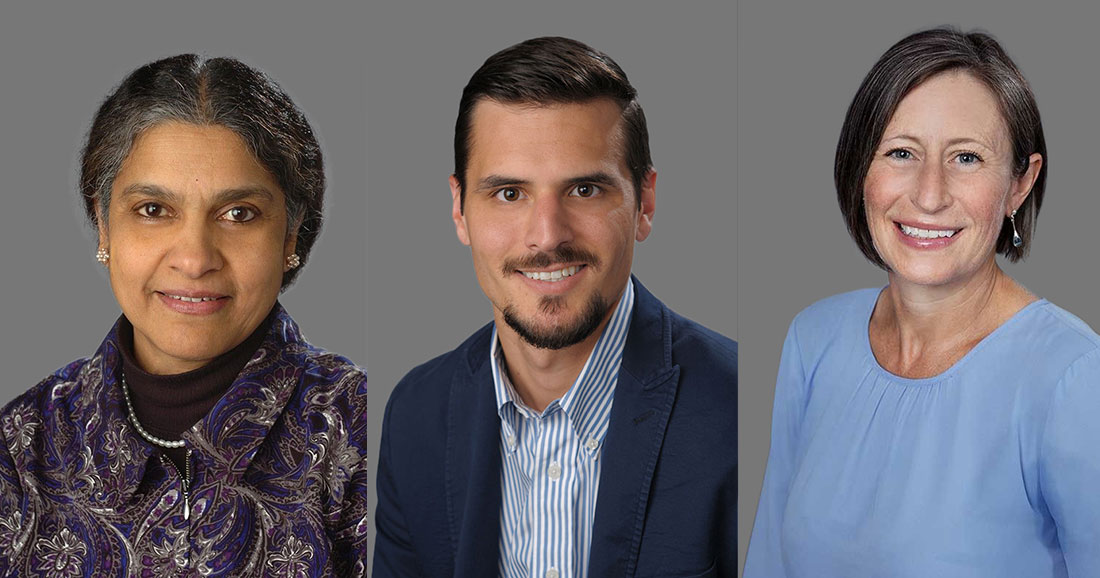
“Every year, we come together to celebrate the outstanding contributions and tremendous success of our students, faculty, staff and broader community,” says Chancellor Kent Syverud. “The accomplishments of this year’s recipients reinforce what it means to be Orange. This ceremony also shines a bright spotlight on the work being done around campus, much of which happens behind the scenes. I thank the many members of our community who organized this event and look forward to recognizing this year’s winners.”
Two major awards—the Chancellor’s Medal and the Chancellor’s Citation for Excellence—will be bestowed. The ceremony will also include the presentation of the Student-Athlete Award, Judith Seinfeld Scholarship, Meredith Professorship for Teaching Excellence, Teaching Recognition Award, Diversity and Inclusion Award, William Pearson Tolley Medal for Distinguished Leadership in Lifelong Learning and Chancellor’s Forever Orange Award.
Emeriti faculty who retired in 2023 and employees who celebrated years of service milestones in 2023 will also be recognized. This year’s University Scholars, Senior Class and School and College Marshals, and Remembrance and Lockerbie Scholars will also be honored.
All members of the University community are invited and encouraged to attend. A reception will follow in the lobby of the Heroy Geology Laboratory.
American Sign Language (ASL) interpretation and Communication Access Realtime Translation (CART) will be provided at the ceremony. For questions about accessibility or to request accommodations, contact Gabe Coleman at gbcolma@syr.edu.
Award Recipients
The Chancellor’s Medal is the University’s highest honor and is awarded to individuals in honor of their trailblazing and extraordinary contributions to the University, to an academic body of knowledge or to society. This year’s recipient is Shiu-Kai Chin, Laura J. and L. Douglas Meredith Professor for Teaching Excellence and professor of electrical engineering and computer science in the College of Engineering and Computer Science.
The Chancellor’s Citation for Excellencerecognizes individuals who have made outstanding contributions in four overarching categories:
- The award for Excellence in Student Research recognizes students who have engaged in collaborative research that has the potential to make a deep and lasting impact on greater society. This year’s recipients are Jingjing Ji, a doctoral candidate in chemical engineering in the Department of Biomedical and Chemical Engineering in the College of Engineering and Computer Science (graduate), and Ashtha Singh, an international relations major in the Maxwell School of Citizenship and Public Affairs and citizenship and civic engagement major in the Maxwell School (undergraduate).
- The award for Outstanding Contributions to the Student Experience and University Initiatives acknowledges faculty and staff who, through their work, enhance the undergraduate experience for students or make invaluable contributions to supporting and advancing the University’s mission and goals. The recipients are Charisse L’Pree Corsbie-Massay, associate professor of communications in the S.I. Newhouse School of Public Communications (faculty); Maureen Casey, chief operating officer for the D’Aniello Institute for Veterans and Military Families (professional staff); Amy Schmidt, program coordinator of citizenship and civic engagement in the Maxwell School (professional staff) and Jolanta Niwelt, events coordinator at Lubin House (support staff).
- The Faculty Excellence and Scholarly Distinction award is intended for faculty members who are collaborators in work of intellectual richness that has the potential for future impact. The work of these nominees offers possibilities for collaboration within the University and outside in partnership with others. This year’s honorees are Wayne Franits, Distinguished Professor in the Department of Art and Music Histories in the College of Arts and Sciences, and Katherine McDonald, associate dean of research and professor of Public Health in the Falk College of Sport and Human Dynamics.
- Chancellor’s Citation for Excellence, Lifetime Achievement Award. This award honors those who have made extraordinary contributions toward advancing all four pillars of excellence over the arc of their careers while at Syracuse University and beyond. This year’s recipient is Shobha Bhatia, Laura J. and L. Douglas Meredith Professor for Teaching Excellence and professor of Civil and Environmental Engineering in the College of Engineering and Computer Science.
The other awards to be presented are:
- The Student-Athlete Award recognizes the top female and top male student athletes and are presented to the senior student-athletes with the highest cumulative grade point average over the course of their academic and athletic careers. This year’s recipients are Izabela Krakic, an international relations major in the Maxwell School of Citizenship and Public Affairs and College of Arts and Sciences and member of the women’s rowing team, and Julius Rauch, an entrepreneurship and emerging enterprises major in the Whitman School of Management and a member of the men’s soccer team.
- Seinfeld Scholarship: Each year Syracuse University honors the talents of outstanding faculty or students through an award made possible by Judith Greenberg Seinfeld ’56, a distinguished alumna and member of the University Board of Trustees. Awards are made to those who have been determined by their peers to have made outstanding contributions to the beauty of the world, to have added to human values and to ending human abuse anywhere in the world, and to have demonstrated passion for excellence, creativity and originality in academic or artistic fields. This year, the designation is bestowed upon a faculty member, Rebecca Ortiz, associate professor of advertising in the Newhouse School.
- The Laura J. and L. Douglas Meredith Professorships for Teaching Excellence were created in 1995 to recognize and reward outstanding teaching among faculty. The 2024-27 Meredith Professors are Joon Park, professor in the School of Information Studies, and Cora True-Frost, Bond, Schoeneck and King Distinguished Professor in the College of Law.
- In 2001, the Meredith Professorship Program was expanded to recognize teaching excellence by non-tenured faculty and adjunct and part-time instructors. Awards are given in two categories: Early Performance and Continuing Excellence. This year’s honorees in the Early Performance category are Kelly Leahy, assistant professor of television, radio and film in the Newhouse School; Farzana Rahman, associate teaching professor of electrical engineering and computer science in the College of Engineering and Computer Science; Milton Santiago, assistant professor of visual communications in the Newhouse School; Darwin Tsen, assistant teaching professor of Chinese and Chinese language in the College of Arts and Sciences; and Nina Wilson, assistant professor in the School of Architecture. The two honorees in the Continuing Excellence category are Kenneth Marfilius, assistant dean of online and distance education and associate teaching professor of social work in the Falk College, and Sudha Raj, teaching professor and graduate director of nutrition and food studies in the Falk College.
- The Diversity and Inclusion Award recognizes an individual who is integral in helping us achieve academic excellence at a university that is welcoming to all through our investments in a diverse, inclusive, accessible and equitable community. This year’s recipient is Suzette Meléndez, teaching professor in the College of Law and faculty fellow for the Office of Strategic Initiatives and the Office of Diversity and Inclusion.
- The William Pearson Tolley Medal for Distinguished Leadership in Lifelong Learning is based in the School of Education and honors national or international leadership in support of lifelong learning. This year’s recipient is Rhodia Thomas ’77, executive director of MidPenn Legal Services, adjunct professor of law at Dickinson University and an alumna of the School of Education.
- The Chancellor’s Forever Orange Award recognizes individual students, faculty or staff who—by virtue of extraordinary hard work, good values and commitment to excellence—have come to embody the best of Syracuse University. This year’s recipients are Colleen O’Connor Bench, associate vice president of parent engagement and student experience, and Ian McIntyre, head coach of the men’s soccer team.
Industry Perspective
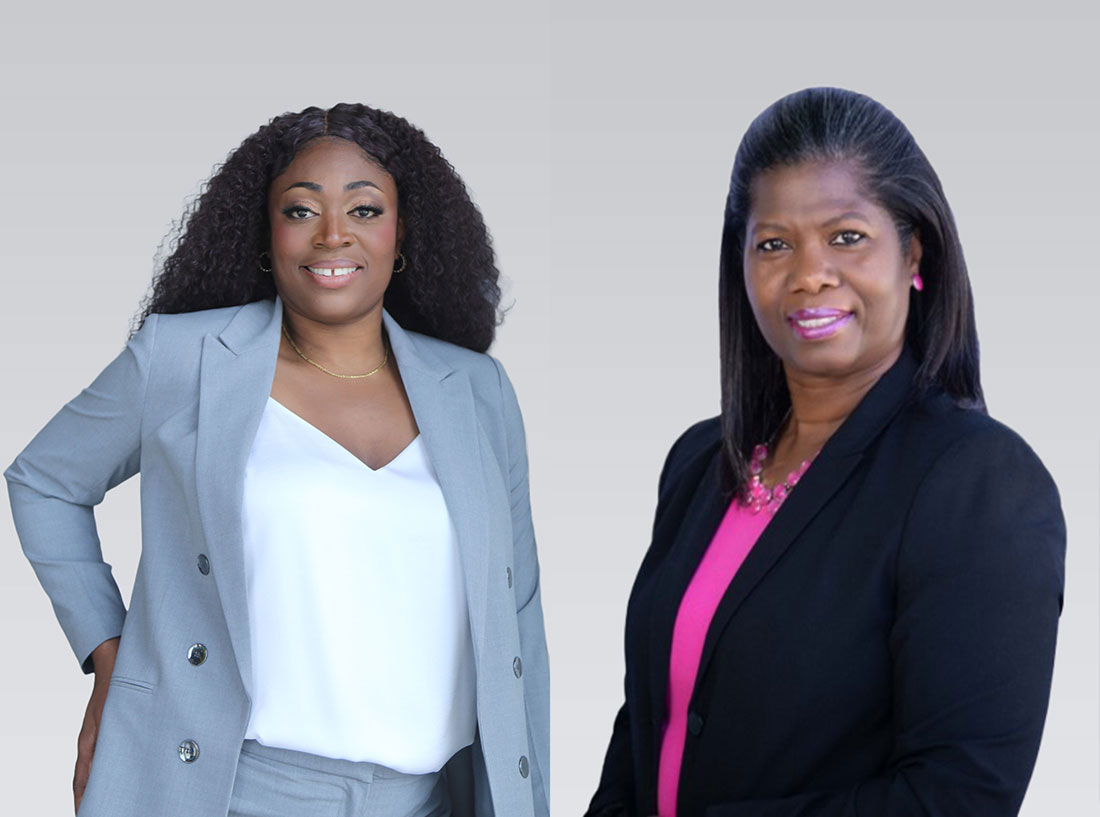
Falk College is pleased to welcome two new board members to the Falk College Advisory Board: Andrea Massop Ramos, MCN, and Tatiana Warren, Ph.D.
The Falk College Advisory Board champions the mission of the college and University to students, alumni, colleagues, and prospective supporters. Board members provide industry perspective and guidance, so Falk students are prepared to enter changing professional fields. They exemplify the values of social responsibility in their citizenship and embody the University’s commitment to diversity and inclusion.
“Falk College is in an exciting season of growth,” says Falk College Dean Jeremy Jordan. “Our primary focus is on elevating the student experience—supporting career readiness through the expansion of purposeful experiential learning opportunities for students. Our Advisory Board plays a crucial role in this effort by bringing insights from a variety of professional disciplines and helping forge corporate and community partnerships. I am confident that Andrea Massop Ramos and Dr. Tati Warren will add valuable contributions in these and other influential ways.”
Andrea Massop Ramos, MCN, is an award-winning clinical nutritionist. After a 20-year career with the airlines, she became the operations manager for Metro North Railroad, where she founded Healthy4U, a Corporate Health and Well Being Group. As an adjunct professor of Clinical Nutrition at New York Institute of Technology, Ramos teaches a required nutrition course for all health professionals. She founded Healthy FRIENDZ Nutrition, LLC, which uses a hands-on culinary platform to teach nutrition education to children and families in a fun, interactive setting. She is also a nutrition consultant for CBS Survivor Productions. Ramos earned her master of science degree in clinical nutrition from New York Institute of Technology.
“Andrea is a clinical nutritionist, private health chef, and entrepreneur,” says Falk College Assistant Dean of Advancement Megan Myers. “We are confident that she will help Falk College expand our connections to the wider community, providing our students with hands-on learning experiences, internships, and job opportunities.”
Tatiana Warren, Ph.D., is a distinguished health equity strategist who established Just TATI, a multimedia initiative to inform and disseminate accurate and evidence-based health topics to diverse audiences. She consults health professionals, community-based organization leaders, educators, and community members in the implementation and evaluation of their health programs. As founder of Just TATI, she works on social justice projects with highly capable and driven organizations that don’t have access to the funding or resources they need to deliver impactful and sustainable community outcomes. She does this by providing access to secure funding and focusing on empowering and elevating local communities.
Warren currently serves as lead Social Scientist Evaluator with Veritas Management Group on projects with The Food and Drug Administration Office of Minority Health and Health Equity and the Centers for Disease Control and Prevention Division of Nutrition, Physical Activity, and Obesity. She also co-leads the Community Engagement and Dissemination Core Advisory Board for the Johns Hopkins Center for Health Disparities Solution.
“As a health equity expert, consultant, and social scientist, Dr. Warren brings a wealth of knowledge and skills related to diversity, equity, inclusion, and accessibility,” says Myers. “As a former Syracuse University track and field student-athlete, she brings a unique perspective to diversity issues among athletes.”
Falk College academic degree programs focus on holistic health and wellbeing, human performance, and sport business enterprise. The college’s signature emphasis on experiential learning supports student success through intentional internship requirements, faculty-mentored research projects, immersion travel, and global study abroad. At every stage of their education, Falk College students engage in meaningful work to advance their disciplines and careers.
Meet all members of the Falk College Advisory Board on the Falk College website.
Exploring Careers
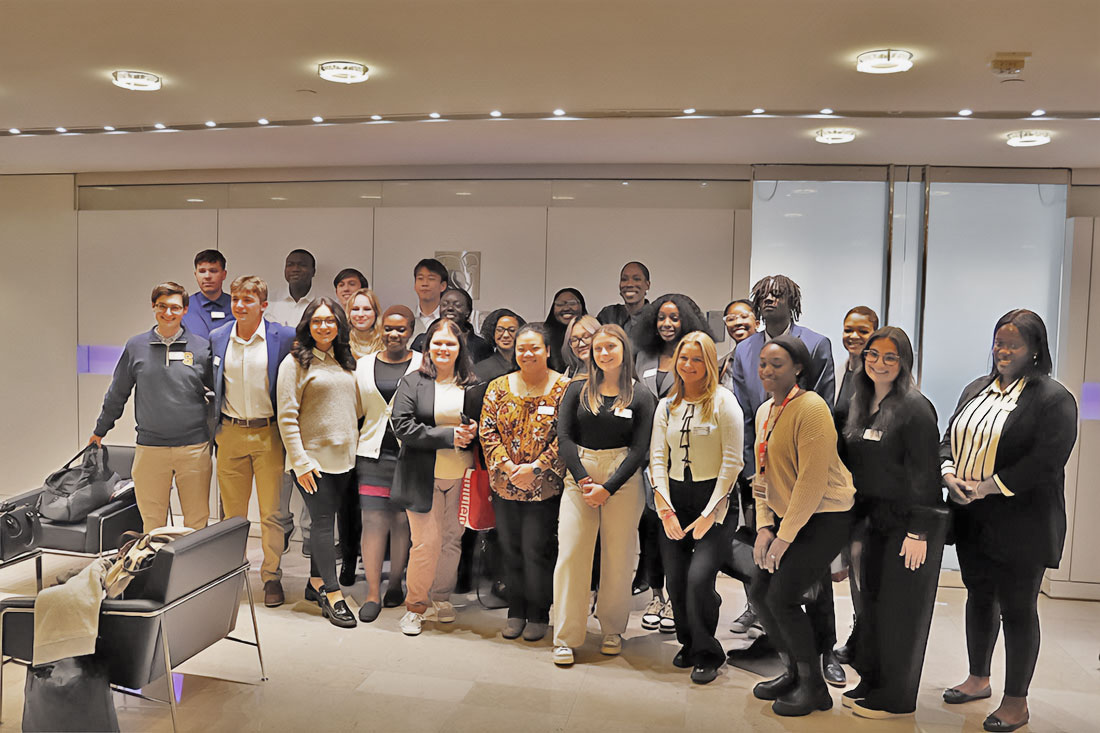
The Falk College of Sport and Human Dynamics at Syracuse University is a unique college with a diversity of programs from Exercise Science to Social Work to Sport Analytics.
The common denominator is Falk’s focus on experiential learning, and this past fall 27 students representing on-campus and online programs from all departments participated in one of the college’s most immersive experiences: the “Falk in D.C. Career Exploration Trip” hosted by the Office of Career Services.
It was the third Falk in D.C. trip, but the first that included separate tracks for health/human services and sport-related careers, with all attending Falk students joining together for select site visits and panels that represented both health and sport professionals. The students engaged with alumni and employer representatives from 28 Washington, D.C., and Baltimore area organizations through site visits and panels, and even more at the alumni networking reception.
“The combined nature of the trip allowed many students to expand their professional interests and discover the overlap between health and sport professions,” says David Sly, associate director of career services. “Over the course of the trip, all attending students demonstrated new or improved ability and confidence in career skills including networking, industry knowledge, communication, and awareness of professional values.”
Health students met with representatives from the FDA, USDA, CDC, Bread for the City, Urban Institute, and MedStar, among many others. Sport students met with representatives from several organizations, including Under Armour, Big League Advantage, Washington Commanders, Monumental Sports and Entertainment, DC United, and Leveling the Playing Field.
All students participated in visits with the NFL Players’ Association, Washington Nationals, Building Bridges Across the River, Living Classrooms Foundation, and PeacePlayers, International.
“The Falk in D.C. Career Immersion Trip gave me the opportunity to learn about the vast array of options that will be there for me post-graduation in the public health field,” says public health major Brinda Parikh ’26. “Being able to hear firsthand from industry professionals about their experiences throughout their careers was very eye-opening, and this trip helped me grow my network of Syracuse University alums that could help me in my own career in the future.”
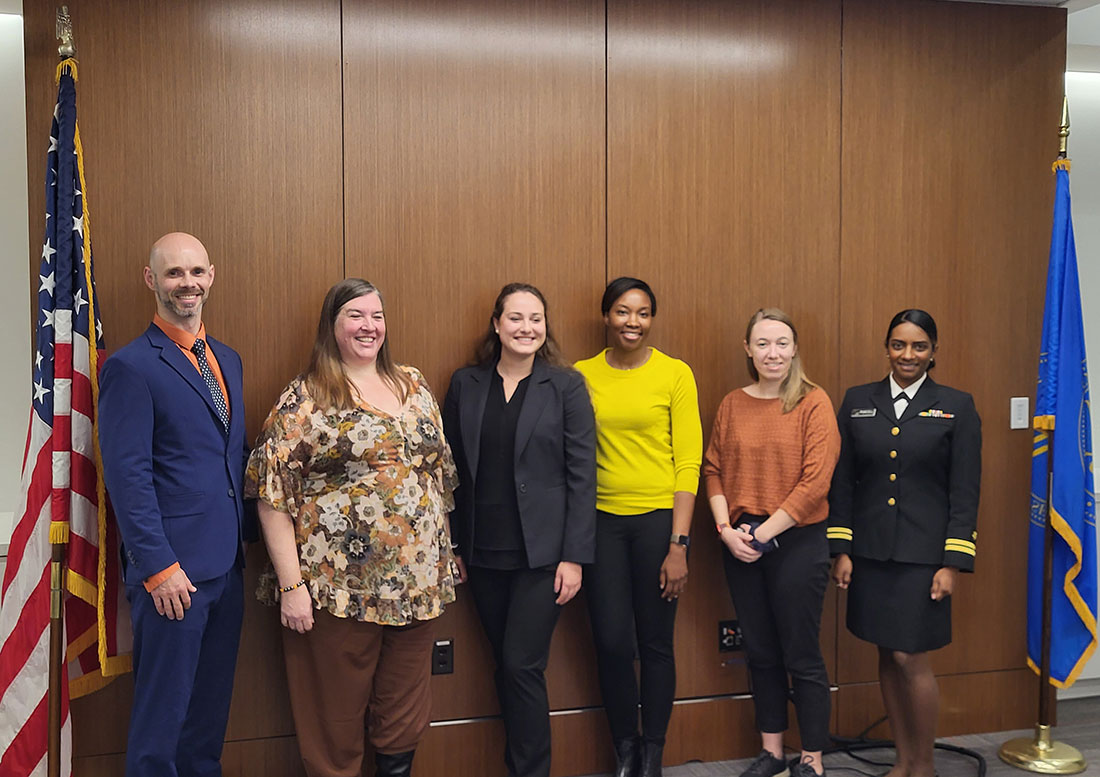
When the students returned from D.C., Career Services asked for their reflections of the trip, how it fit into their decision to attend Syracuse University, and their career goals. Here, we’re sharing responses from five students from across the college: master of social work student Nicole Corrente, public health major Tommy DaSilva ’26, health and exercise science major Alexia Harris ’26, sport management major Brianna Nechifor ’26, and sport analytics major Liam Roberts ’27.
Why did you choose Syracuse University and Falk College?
Alexia Harris: I chose health and exercise science because I have always loved studying the way the body works and moves. I chose Syracuse University because its program is amazing and has already set me up for success in my first semester here.
Tommy DaSilva: I chose both of my majors (public health and policy studies) because I wanted to be able to improve the lives of others through government action or nonprofit community work.
Brianna Nechifor: I chose to become a sport management major because I was encouraged to enter the industry by my tennis coaches and friends who saw my burning passion for sports. I chose Syracuse University because of the community and opportunities that are available to me, including the Sales and Marketing Club, Sport Management Club, and WISE (Women in Sports and Events).
Nicole Corrente: I’m a graduate student of social work who’s originally from Syracuse, so choosing Syracuse University was a natural fit.
Liam Roberts: Outside of school my biggest passion has always been sports and in school I always enjoyed math and working with numbers. As a result, the sports analytics major was perfectly catered to what I am interested in and what I want to do in life. The opportunities this major provides, including ones like this D.C. trip, were not available anywhere else and it’s ultimately why I chose to attend Syracuse.
What are your top three highlights so far from your Syracuse University experience and what are your career goals?
Brianna Nechifor: My top three highlights have to be the introduction of the new esports major, a field that I am very passionate about; the Falk in D.C. Exploration Trip; and the Sport Management Charity Sport Auction (shoutout to the Sales Committee!). My ultimate career goal is to work in esports, possibly in event management.
Nicole Corrente: My top three highlights have been my graduate coursework and research; the Falk in D.C. trip; and all the amazing connections I’ve made along the way. In the future, I plan to have a career in anti-trafficking efforts as a therapist for survivors of trafficking.
Alexia Harris: My top three highlights so far are setting up my internship with strength and conditioning in the athletics complex for next semester; being able to go on the Falk in D.C. trip; and all the different campus opportunities available. My ultimate career goal is either to go into athletic training or sports nutrition.
Liam Roberts: My Syracuse experience has only just begun, so my highlights are likely still to come. But so far, my No. 1 highlight would definitely be this trip, while other great experiences are connecting with Professor (Shane) Sanders and participating in the basketball and baseball analytics clubs.
Tommy DaSilva: Highlights of Syracuse so far have been my service-learning work with International Services and the YWCA; the work done by my organization SAPHE (Student Association of Public Health Education); and the professional connections I have been able to make. I don’t have a specific ultimate career goal as I’m open to any opportunities that come my way, as long as they can be used to help someone in some way.
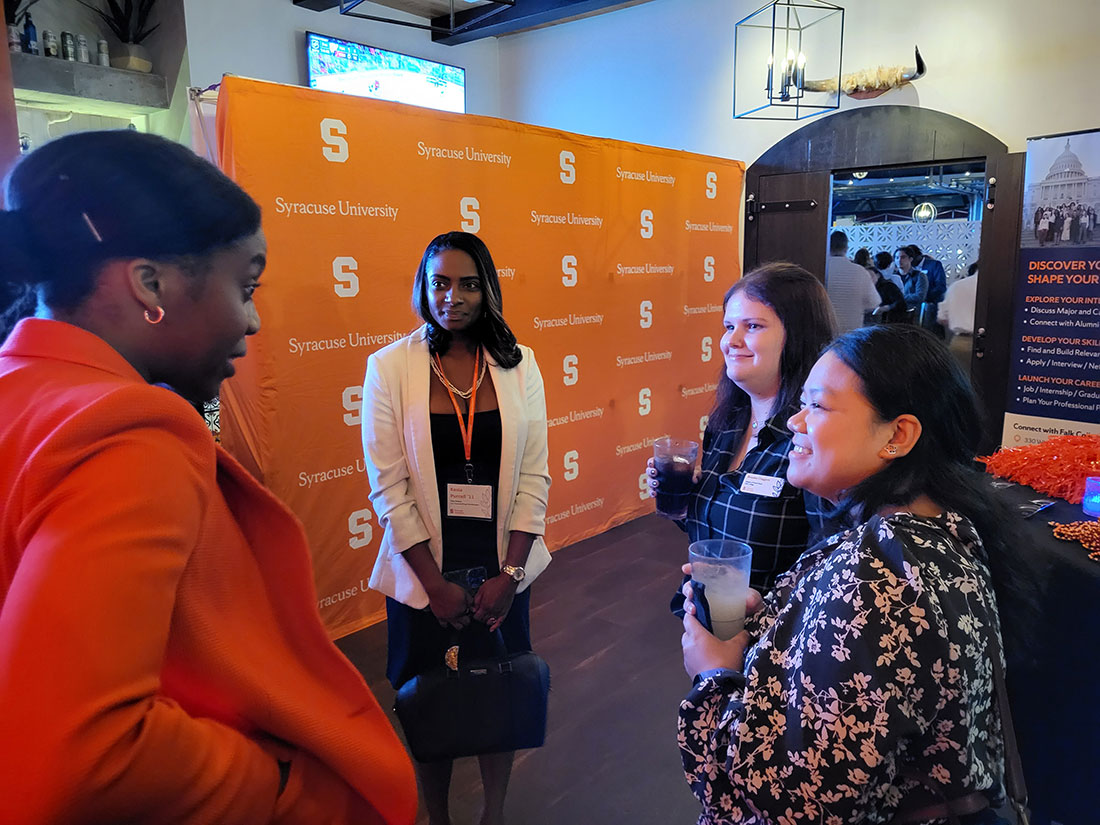
What is your most memorable takeaway from the Falk in D.C. trip?
Liam Roberts: I engaged with and explored exciting opportunities within the sports industry that I would have otherwise never been able to experience, and in a manner that was fun and interesting. This experience was one that I could not see myself getting anywhere else and I’m glad I had the opportunity to join.
Alexia Harris: This trip provided me with exposure to a lot of different employment opportunities and fields that I had never thought about before, as well as connecting me to a wide variety of people.
Tommy DaSilva: This trip gave me insight into potential careers that I would have never thought possible without these face-to-face conversations.
Brianna Nechifor: I was able to interact with a variety of perspectives in the sports industry, even those you may not think you have a connection with them. Everything is in one way connected, and this trip can help shift your opinions on different sectors of the industry. It’s honestly something you shouldn’t be afraid to apply for!
Nicole Corrente: This was an amazing experience! This trip provided me with once-in-a-lifetime opportunities to meet representatives from the CDC, HHS, ACFS, and several nonprofit agencies. Learning about these organizations taught me a lot about the importance of a strong work ethic and an open mind. I look forward to staying connected to the Syracuse University alumni that I met and staying engaged with the work they’re doing in D.C.
Students interested in the “Falk in D.C.” trip in the Fall 2024 semester can watch a video summary of the trip and find Fall 2024 updates on the Falk Careers home page.
Moving Forward, Looking Back
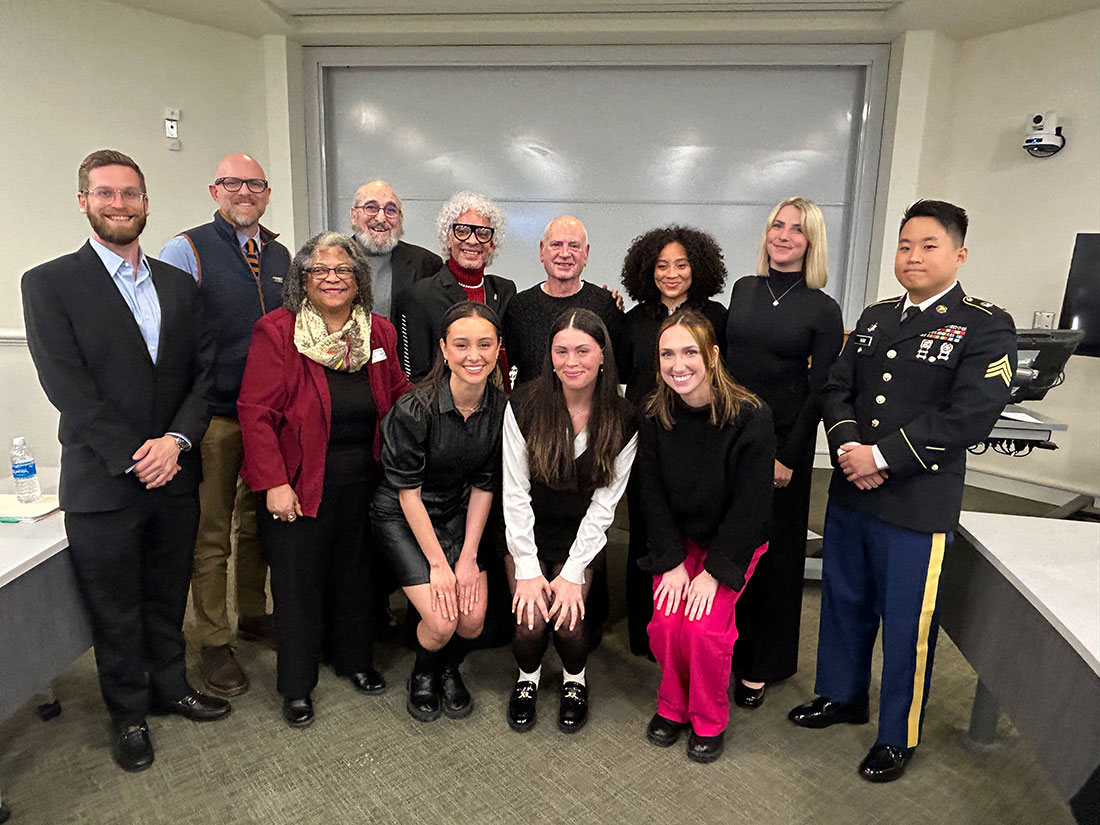
Alejandro Garcia is no longer with us, but his kind and generous spirit filled 200 White Hall March 19, when the School of Social Work in Falk College presented its annual Dan and Mary Lou Rubenstein Social Justice Award program.
Garcia, Professor Emeritus of social work in Falk College and a founding faculty member of the social justice award, died Nov. 17, 2023, at age 83. From heartfelt memories to humorous anecdotes, Garcia was top of mind during the event from School of Social Work Chair Carrie Smith’s opening remarks to stories shared by Social Justice Award winners Eric Kingson and José Miguel Hernández Hurtado and keynote speaker Dan Sieburg.
The theme of the program, “Sankofa: Honoring the Past and Embracing the Future,” was inspired by a word from the Akan People of Ghana that means to move forward guided by the wisdom of the past.
“His was a beautiful life lived, against the odds, in the service of others,” Smith said of Garcia. “He will be missed, but always remembered. We will always look back to remember his life.”
Garcia was a staunch advocate of Falk’s social work students, and he would have been delighted that members of Social Workers United – the Social Work student organization – and graduate social work students moderated the event and added an enthusiastic student presence to the ceremony. The students who participated in the program included Mary Claytor, Gideon Casper, Laysha Johnson, Taylor Koennecke, Brenic Nam, and Gianna Pezzino.
The program, which was held in commemoration of national Social Work Month in March, honored Hurtado, founder and artistic director of La Joven Guardia del Teatro Latino, and Kingson, professor of social work at Syracuse University. The program also featured Sieburg, Chief Executive Officer of the Rescue Mission Alliance of Syracuse, followed by a reception in Wildhack Lounge.
Sieburg, Kingson and Hurtado all shared stories about Garcia and the enormous impact he had on their lives. Sieburg’s topic was “Investing in Human Capital,” another way of saying that we need to recognize the importance of human relationships. Sieburg shared how Garcia encouraged him to reach higher in his career and helped him become CEO at the Rescue Mission. In exchange, all Garcia wanted was a 50% off coupon to Rescue Mission stores, Sieburg explained, laughing.
During the program, Sieburg announced that the Rescue Mission’s youth shelter was being renamed the Alejandro Garcia Runaway & Homeless Youth House.
Sieburg shared that when he visited Garcia during his final days in the hospital, Kingson and Hurtado were often there, holding his hand, shaving his face, and advocating for his care. So, for Kingson and Hurtado, being honored on the same night as Garcia made the ceremony even more special.
“I’m delighted and appreciative. It means a lot to me,” said Kingson, who was friends with Garcia for more than 50 years. “It’s a recognition that we all have an obligation to follow Alejandro’s footsteps and advance the well-being of others.”
Presented for more than 30 years, the Rubenstein Social Justice Award is given in honor of the late professor Dan Rubenstein, a former faculty member in the School of Social Work, and his late wife, Mary Lou, a former school social worker. Recipients of this award are role models whose courage and strength inspire others to stand up—and step up—to advocate and be a voice in the Syracuse community. The values of social justice are integral to their daily lives. The work of honorees each year, by their individual and collective examples, represent the true spirit of the Rubenstein Social Justice Award.
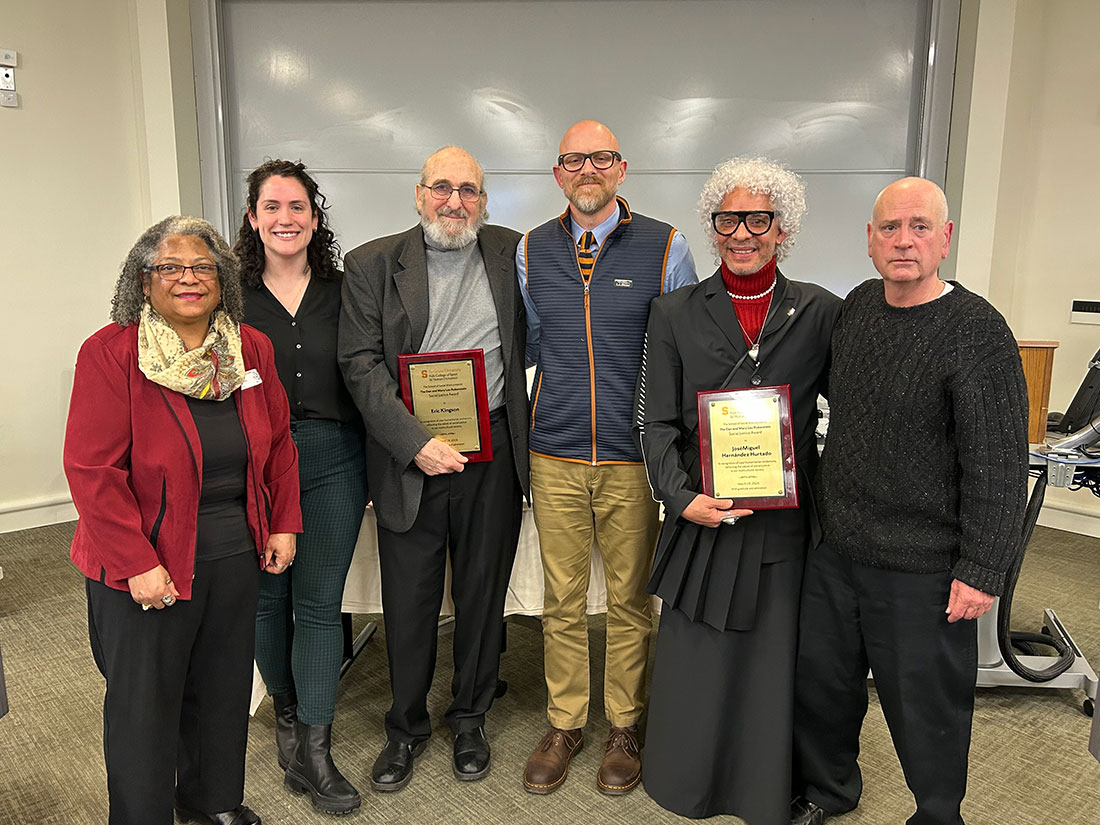
Here’s a closer look at this year’s awardees:
Eric Kingson
Kingson’s 55-year career traces back to his involvement in the civil rights and anti-war movements of the 1960s. His work is grounded in ethical principles and values that promote human dignity, democracy, racial justice, service to others, self-determination, adequate wages and incomes, access to health care, affordable housing, and meaningful employment. In addition to holding faculty positions in social policy at three universities, Kingson is recognized nationally for his expertise in, and advocacy of, Social Security as an institution that advances economic security across generations. He served as advisor for two presidential commissions and the Social Security Administration’s 2008-2009 transition team.
In 2009, Kingson co-founded Social Security Works, a national organization with a mission to preserve and expand the Social Security system. His belief that politics can be an instrument of social justice led him to run as a congressional candidate in 2016 and serve as a New York State member of the 2016 Democratic National Convention Platform Committee. Professor Kingson has authored numerous articles, books, and commentaries with his research and writing focused on the politics and economics of aging, Social Security, cross-generational responsibilities, retirement, and caregiving across generations. His most recent book is Social Security Works for Everyone! (2021), co-authored with Nancy J. Altman.
José Miguel Hernández Hurtado
Hurtado is originally from Cuba and has lived in Syracuse since November 1997. In Cuba, Hurtado was selected as Best Male Actor in a national student competition. His first 17 years in Syracuse were spent as a physical therapy aide at Rosewood Heights Health. Simultaneously, Hurtado organized and directed a theater company that he founded in 1999 under the Spanish Action League, serving as artistic director and dance instructor. Currently he works at Upstate Golisano Children’s Hospital in the Pediatric Emergency Department.
Hurtado has directed over 21 contemporary and classical Spanish children’s plays. He received the Excellence in Outstanding Achievement for Direction Award for directing several plays: Gabriel García Márquez’ “A Very Old Man with Enormous Wings” in 2008; Miguel de Cervantes Saavedra’s “Adventures of Don Quixote” in 2011; and in 2012 “The Enchanted Shrimp,” a version of the French Laboulaye written by José Martí. He adapted “The Enchanted Shrimp,” among others, for the stage. Hurtado’s work on the radio and in theater in Cuba carried over to his life in Syracuse. He has maintained his firm belief that every child needs and deserves an opportunity to reach for a better place in which to live, and to realize their dreams for a better future.
Dan Sieburg, Keynote Speaker
Keynote speaker Dan Sieburg is Chief Executive Officer of the Rescue Mission Alliance of Syracuse. For 25 years he has worked in the non-profit human services sector, and the last 16 have been dedicated to providing housing, shelter, food, and clothing for the hungry, homeless, and housing vulnerable in Central New York. Sieburg is a New York State Licensed Social Worker, a former adjunct professor in the School of Social Work, and an alumnus of Syracuse University’s Master of Social Work program. The Rescue Mission Alliance of Syracuse was the recipient of the 2018 Dan and Mary Lou Rubenstein Social Justice Award.
Desire to Give Back
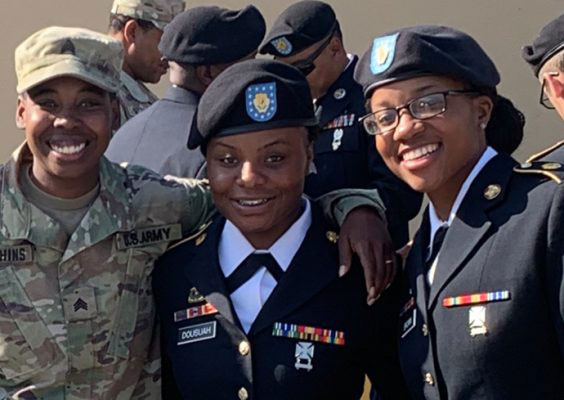
U.S. Army veteran Benetta Dousuah G’25, currently a graduate student in the Falk College of Sport and Human Dynamics, vividly recalls her family’s escape from Liberia during the back-to-back civil wars that ravaged the nation between 1989 and 2003. Initially seeking refuge in a camp in Ghana, it took almost a decade before they secured the opportunity to immigrate to the United States.
In reflecting on her resettlement experience, Dousuah expresses deep gratitude for the social workers who played a pivotal role in providing stability for her family, especially considering Liberia’s dire circumstances during the 2014 West Africa Ebola Virus outbreak, the worst in recorded history. In the remote villages scattered throughout West Africa, young women are often an indicator of viral outbreaks since they often serve as caretakers in their rural communities.
The enduring memories of U.S. Army soldiers providing humanitarian aid in her homeland influenced Dousuah’s decision to enlist in the military. While she was initially drawn by the educational benefits like the post-9/11 GI Bill, her desire to give back and assist those in need also significantly influenced her choice.
“After we came here from Liberia, I remember seeing soldiers helping out on the news. At the time it spoke to me, and I wanted to reciprocate that same energy, so I chose to enlist in the Army,” says Dousuah.
Dousuah served as a unit supply specialist, a crucial role in the logistical backbone supporting the U.S. military’s global presence. The military’s logistical units often play a vital role in humanitarian operations, particularly in remote areas with limited infrastructure.

In 2014, the U.S. Army responded to the Ebola outbreak in Liberia by constructing specialty field hospitals and providing essential medical services throughout the region. By 2021, Dousuah, now a Sergeant in the U.S. Army and a mother to a young daughter, found herself offering the same kind of assistance to refugees that her family was shown when they fled Liberia
“We were deployed to Indiana to help with the Afghan refugee resettlement process,” says Dousuah, who identified parallels between her experiences coming to the U.S. and the Afghan families she assisted. In addition to her regular duties, she contributed to developing classes for children and volunteered as a teacher. This direct involvement inspired a long-term goal of establishing a school in Liberia.
“I plan on going back to Liberia after graduate school just to get the idea of what I need to do first, but ultimately I want to get the foundation going to try and build, and then open, a school there,” says Dousuah.
As an Army veteran, Dousuah is committed to supporting service members and veterans dealing with mental health challenges. Her motivation stems from personal experiences working with soldiers struggling to access adequate behavioral health services and recognizing the insufficient support for Black women in particular.
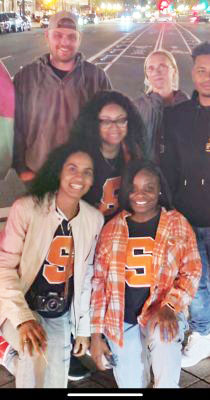
“Our mental health is not taken as seriously as it should be. If I’m experiencing social anxiety I may not be comfortable in the situation, but that’s not how people see it,” says Dousuah. “They just label us as angry, and it puts a lot of pressure on us when it comes to our mental health.”
According to the U.S. Department of Health and Human Services, women veterans aged 26 or older are among the most vulnerable members of the veteran population when it comes to suffering major depressive episodes. Dousuah sees her studies as a way to integrate both goals.
“While my concentration is on the clinical side of social work, I’ve also been able to take AIP (Advanced Integrated Practice) classes, which are more policy-related in a way,” says Dousuah. “My classes are helping me implement what I’m learning into the idea of building the school.”
Dousuah also seized an opportunity to assist her fellow veterans by interning with the College of Law at the Betty and Michael D. Wohl Veterans Legal Clinic.
“The work that I do in my internship is compelling because I get to help other veterans, particularly veterans like me or going through things I’ve been through. It’s helped me understand the whole holistic aspect of connecting veterans to resources, some of which I knew nothing about before,” says Dousuah.
To learn more about military-connected students at Syracuse University, or the programs and services available to them, please visit the Office of Veteran and Military Affairs website.
An SU News story by Charlie Poag originally published on Feb. 26, 2024.
Supporting Veterans
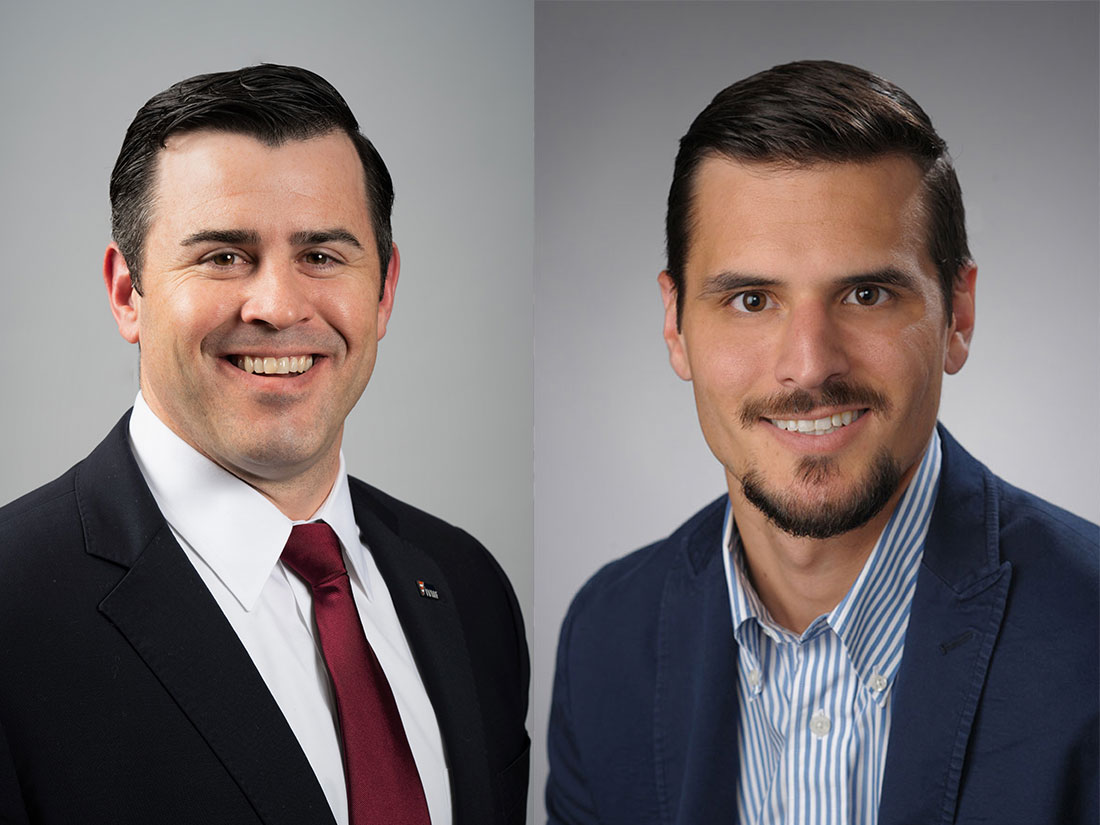
Ken Marfilius and Nick Armstrong are U.S. military veterans who have dedicated their lives to helping active military members, veterans, and their families.
Together, they have created a new and innovative partnership starting this spring that will greatly benefit veterans as well as students from the School of Social Work at Syracuse University’s Falk College of Sport and Human Dynamics.
Marfilius, a U.S. Air Force veteran and assistant dean of online education and associate teaching professor in the School of Social Work, and Amstrong, a U.S. Army veteran and head of public sector at Cabana, teamed with Cabana Co-Founder and CEO David Black to form a partnership that will integrate their immersive group support technology into the School of Social Work’s curriculum and tap into the combined strengths and capabilities of both organizations.
“Our collaboration with Ken and Falk leverages our immersive support technology platform, Cabana, and combines it with Syracuse University’s academic excellence and its nationally recognized commitment to veterans,” Armstrong says. “Our plan includes hands-on initiatives such as internships, collaborative education, and joint research. These efforts will bring our partnership to fruition and strengthen our shared commitment to serving military communities.”
As Syracuse University’s first Post 9/11 GI Bill recipient, Armstrong earned his M.P.A. and Ph.D. from the Maxwell School of Citizenship and Public Affairs. He spent nine years at Syracuse’s D’Aniello Institute for Veterans and Military Affairs before joining Cabana, which builds innovative technology solutions that provide guided mental health support for employers, healthcare workers, and military professionals.
Marfilius, who received his bachelor’s degree in psychology from Syracuse and his M.S.W. and D.S.W. degrees from the University of Pennsylvania, developed the first military mental health course at Falk College, serves as Falk’s student veteran liaison, and led the creation of the partnership between Falk and Syracuse University’s College of Law that helps help veterans access the legal services they need.
So, when Armstrong reached out to Marfilius to discuss ways in which they could partner around the services Cabana provides to military populations, Marfilius jumped right in and started working with Armstrong and Black on the framework for their collaboration.
“I believe the partnership between Cabana and Falk College is innovative in social work education and mental wellness,” Marfilius says. “It offers the ability to integrate real-world internships and cutting-edge tele-mental health training into our curriculum. We can prepare our graduate students for the future of social work, ensuring they are not only skilled but also technologically adept.” Marfilius and Armstrong discuss this partnership on Cabana’s “You’re Always fine” podcast in an episode called “Building bridges in mental health.”
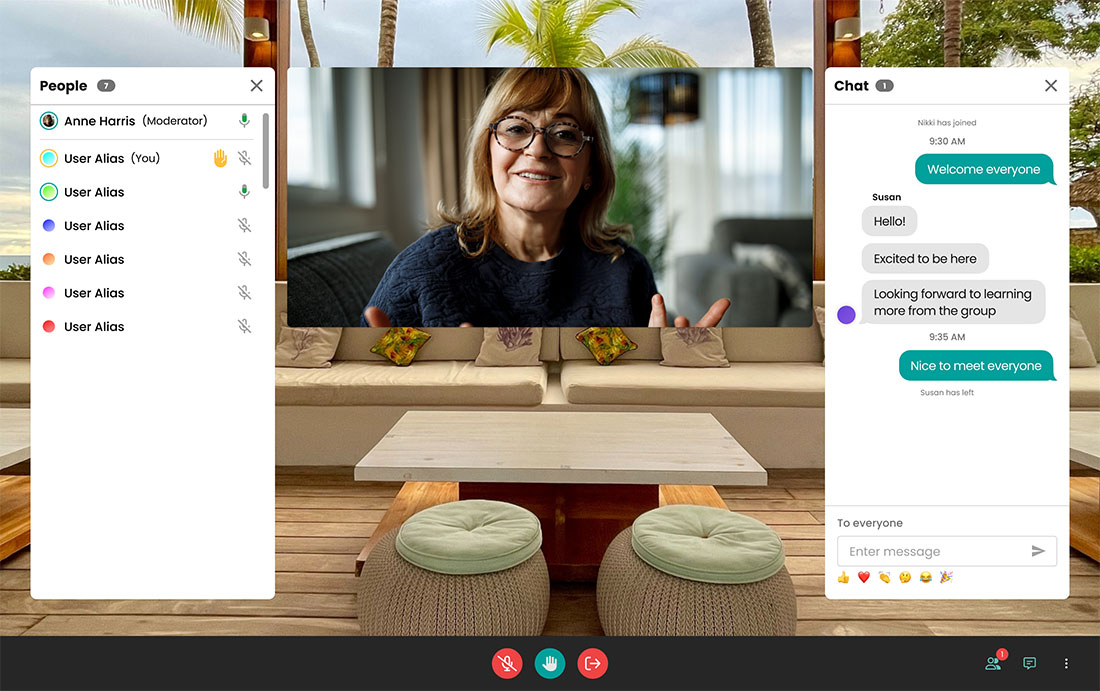
Here are the highlights of this unique partnership:
Cabana Internship.
Cabana will host one graduate student intern from the School of Social Work to support ongoing peer group support operations and psychoeducational content development. The intern will work under the supervision of Cabana’s head of mental wellness for a minimum of 500 hours.
Tele-Mental Health Training and Education Support.
Cabana will collaborate with Falk College faculty to embed its immersive group support technology into ongoing coursework and curricula to foster training and preparation of future social work professionals.
“The tele-behavioral health landscape is evolving rapidly, demanding practitioner and client adaptability to virtual environments,” Armstrong says. “Our partnership infuses Falk’s curriculum with leading-edge tools via Cabana’s underlying technology platform, better preparing students for client engagements through digital platforms.
“Moreover, Falk students, equipped with an advanced tier of military cultural competence, will enhance our clients’ experiences–and their future clients–with more relatable, informed support that builds trust and overcomes stigma,” Armstrong adds.
Military and Veteran Virtual Peer Groups.
Cabana will work with Falk faculty and its alumni network to assist ongoing virtual peer support groups for military and veterans starting this spring.
“This collaboration aligns with the Syracuse University mission to be the best place for vets, and it uniquely positions us to offer specialized support to our military and veteran communities,” Marfilius says. “Through virtual peer support groups and the development of tailored psychoeducational content, we are providing them with the essential mental health support they deserve.”
Military and Veteran Psychoeducational Content Development.
Cabana will work with Falk College faculty to review and evaluate Cabana content as a third-party reviewer.
“Engaging with industry partners allows us to bring practical, real-world experiences into our academic environment,” Marfilius says. “This partnership brings vast possibilities for research collaborations and advancement in peer interventions and group psychoeducation.”
CEU/Education Credits.
Falk College faculty will provide feedback, evaluate, and where appropriate, certify Cabana groups and content to satisfy New York State CEU (continuing education unit) requirements for wellbeing hours.
Research Collaborations.
As opportunities arise for Cabana and Falk College, the two entities agree to evaluate research collaborations and grant opportunities surrounding peer interventions, group psychoeducation, and other forms of mental health support.
“This collaboration aims to address the critical national shortage of mental health professionals, leveraging technology to extend reach and overcome barriers to access, especially for underserved populations,” Armstrong says. “It’s not just about serving more; it’s about serving smarter and cultivating a workforce ready for the challenges of today’s and tomorrow’s mental health landscape.”
Social Work students interested in getting involved in this partnership should email Marfilius at kjmarfil@syr.edu, or School of Social Work Director of Field Education Tracy Walker at ttwalker@syr.edu. Graduate students interested in the internship will go through an interview process with the School of Social Work and Cabana, and the intern will receive a modest stipend.
Special Delivery
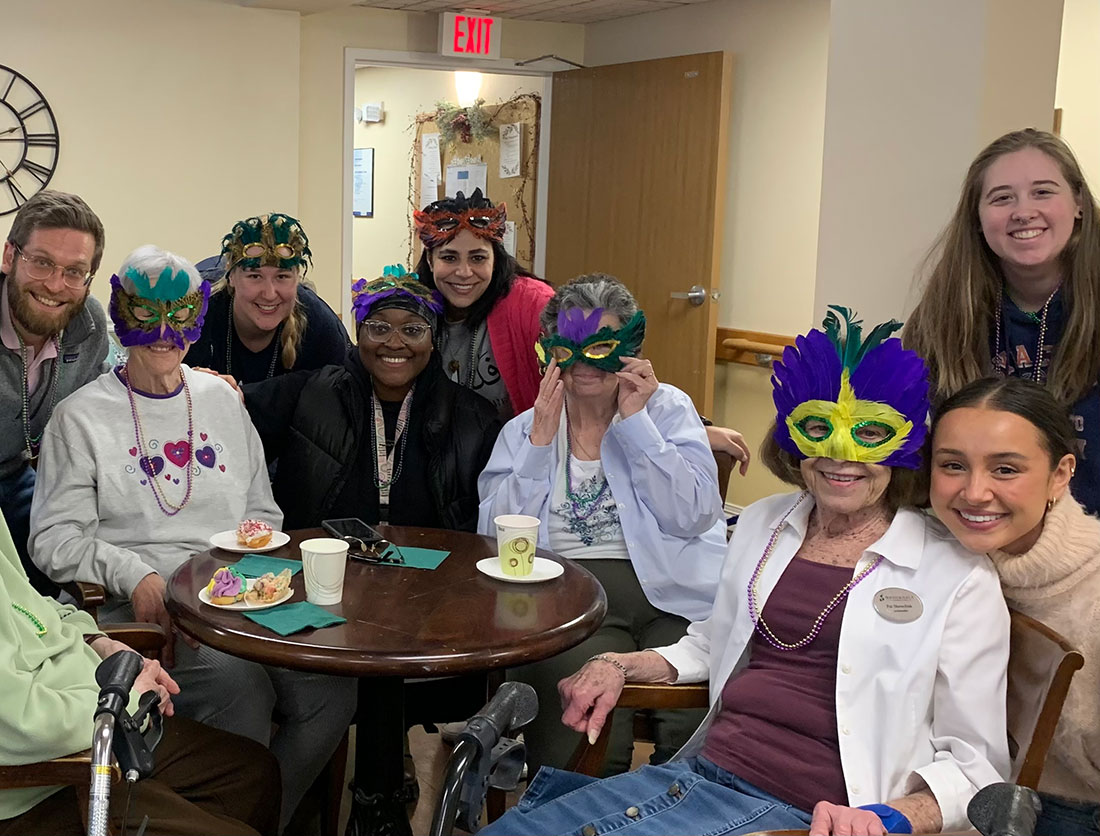
This was going to be a story about the Social Workers United student group from Falk College and how it once again organized an event to benefit the Syracuse community.
And it still is.
But if you dig a little deeper, this story is much more than that.
It’s about how these students “continue to exemplify the values of social work: service, commitment to clients, and social justice,” says Jennifer Genovese, School of Social Work assistant teaching professor and Master of Social Work Program director who oversees Social Workers United (SWU).
It’s about a woman named Dolly, a resident of Brookdale Summerfield Senior Living in Syracuse who, before SWU students came to visit Feb. 13, hadn’t celebrated Valentine’s Day since her husband died.
And it’s about the kindness that Dolly showed her students as a teacher years ago, the kindness that SWU students showed Dolly and her friends Feb. 13, and the hope that even with the politics, wars, and mass shootings that dominate our headlines today, kindness is still all around us.
“We are so proud of our future social workers,” Genovese says. “They are shining a light toward a brighter future.”
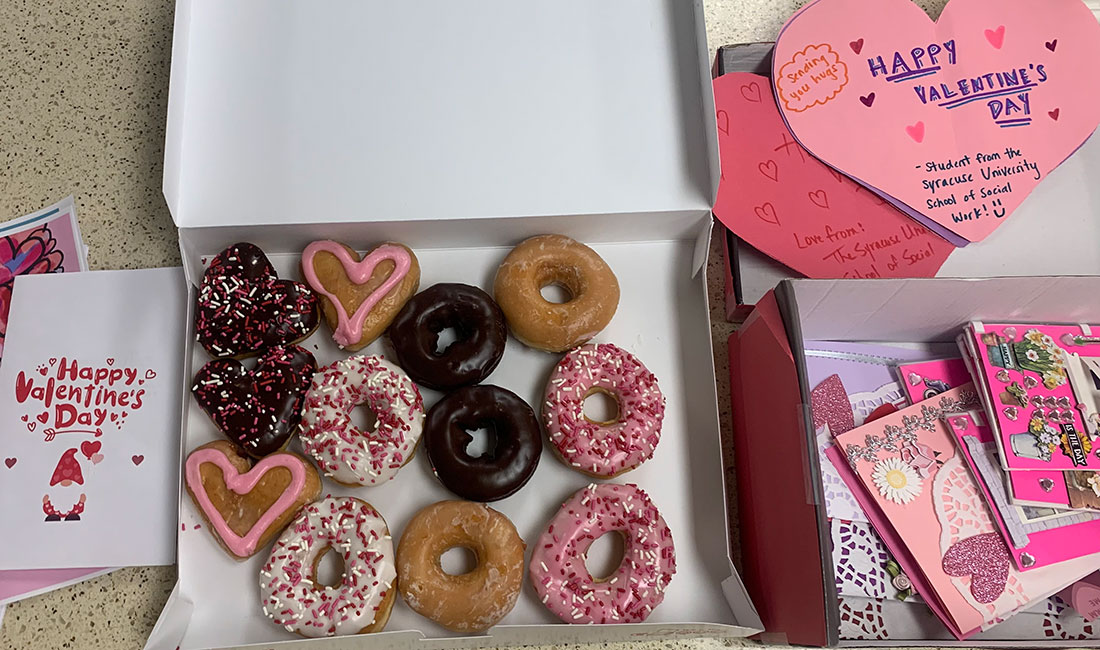
‘An Amazing Group’
Social Workers United is the student group of the School of Social Work at the Falk College of Sport and Human Dynamics. Each semester, the students organize a food or clothing drive, and this past fall they collected food for the Hendricks Chapel Food Pantry that helps students experiencing food insecurity.
Faculty advisors Nadaya Brantley, Kristen Esposito, and Genovese advise and support the SWU students as they develop service projects, but the students lead the projects. For their first project of the spring semester, the students arranged a Valentine’s Day event for the residents of Brookdale Summerfield, an adult home and adult home memory care community for seniors.
On Feb. 13, the SWU students delivered handmade Valentine’s Day cards with personal messages, heart-shaped donuts, and balloons to the Brookdale residents, who were already celebrating Mardi Gras. SWU’s arrival added a boost to the celebration.
“The Valentine’s were collected in the Social Work office, and I really thought one student, (SWU president) Mary Claytor, was just going to drop them off at Brookdale,” Genovese says. “I had no idea the entire group of students was going and bringing balloons and donuts. The students organized all of this and paid for it themselves as SWU does not receive funding. They are an amazing group!”
Claytor, a first-year graduate student and graduate assistant who’s on track to obtain a master’s degree in social work, says when the students arrived, each one went to a different table to deliver their cards and engage in conversations. It didn’t take long before one of the residents shared a story about receiving two purple hearts from his service in World War II.
“There were so many incredible stories and lots of laughter,” says Claytor, who’s from Denver, Colorado. “Some folks were so surprised that we would dedicate time to them and asked for us to come back soon! It was a great experience, and we were happy to do something special for a group of people who did not expect to be celebrated.”
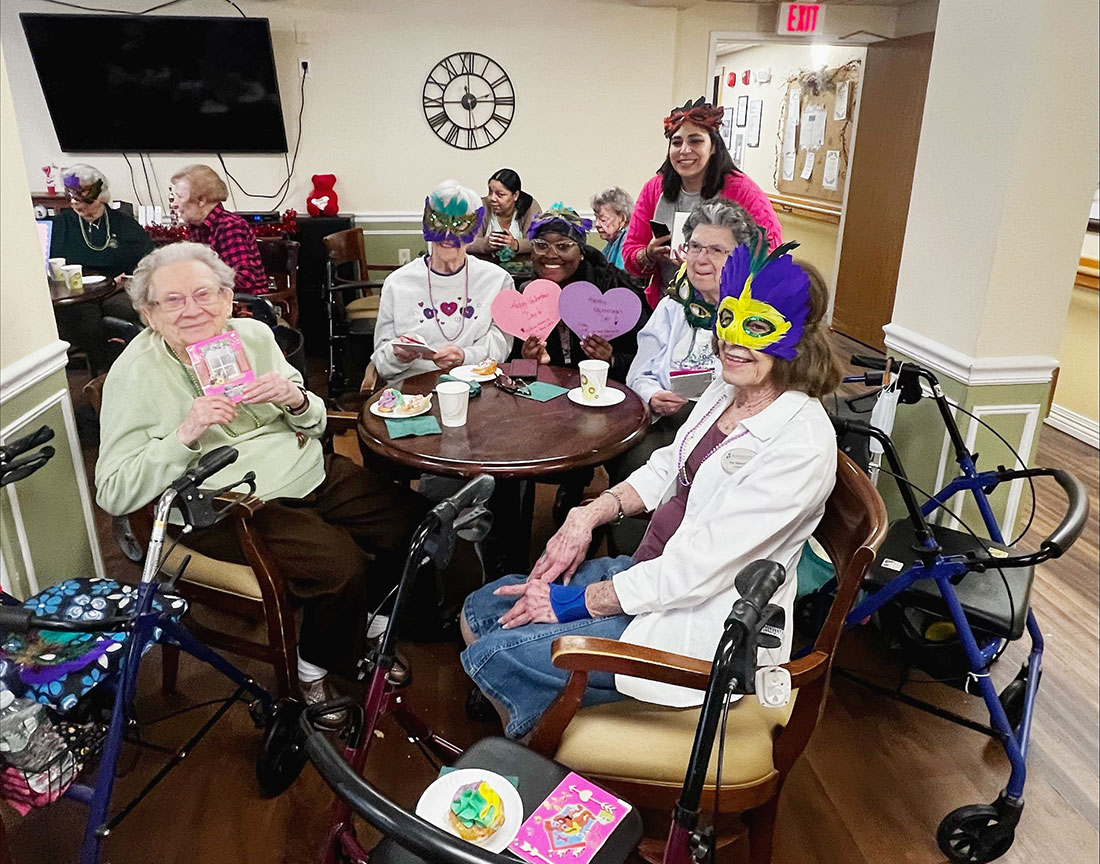
‘A Calling to Help’
Keianah Greene, a graduate student in the Masters of Clinical Social Work Program, entered the room with the other SWU students and went to a table where she met Dolly and her friends. Dolly said she hadn’t celebrated Valentine’s Day since her husband passed, but when she learned the students were coming, she wanted to attend and learn more about them.
Greene, who’s from the Bronx, New York, and now lives in Syracuse, explained why she wants to be a social worker and they talked about family and how important it is to be loving, kind, and optimistic despite our daily struggles.
“Dolly mentioned that she was a middle school teacher in Birmingham, Alabama, and that her mother had told her at an early age that she had a calling to help people,” Greene says. “She also mentioned the number of children she worked with and how they used school as an escape from problems they were having at home. So she always made sure to bring extra supplies for her classroom such as clothing, snacks, and other necessities.”
Dolly told Greene that caring for others is fulfilling, but making sure that all the children in her classroom were included was challenging. Dolly emphasized the value of support systems and self-care for social workers and other caregivers.
“You can’t care for anyone if you don’t take care of yourself first,” Dolly told Greene.
As Greene was saying goodbye, Dolly told her that on this Valentine’s Day, she felt like she was reunited with her husband.
“She was happy to say that she knew this was her husband’s sign to come meet us (the students), and that our heart-to-heart conversation meant a lot,” Greene says. “I’m glad that I was able to learn from her and also spread the love.”
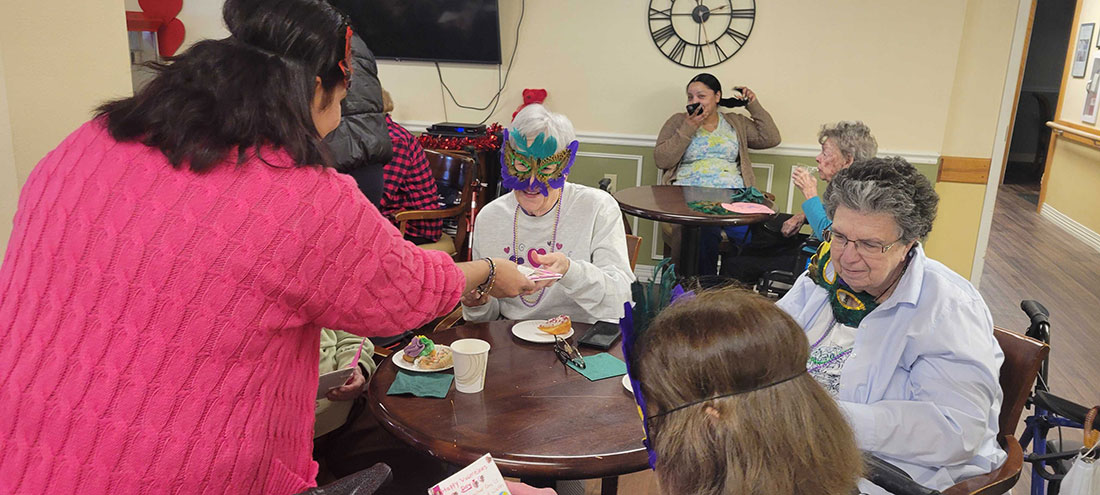
‘Brightens Their Day’
During their visit, Claytor spoke with Brookdale’s activities director about other ways the students might be able to get involved with the residents.
They discussed Brookdale’s game-and-movie nights, which would be an opportunity for students to engage with residents in a fun way. They talked about students helping the residents start a new garden with flowers, fruits, and vegetables when the weather gets warmer.
Claytor assured the director that the students would be happy to help in any way possible.
“During our conversation, she mentioned that the residents often feel forgotten,” Claytor says. “They miss socializing with new people and having stimulating conversations about the future. She explained that it really brightens their day when visitors come to see them, especially students.”
Kindness, it seems, is not a relic of the past that’s being thrown out with landline telephones, DVDs, and alarm clocks. It’s all around us; we just have to know where to look.
New Dean for Research
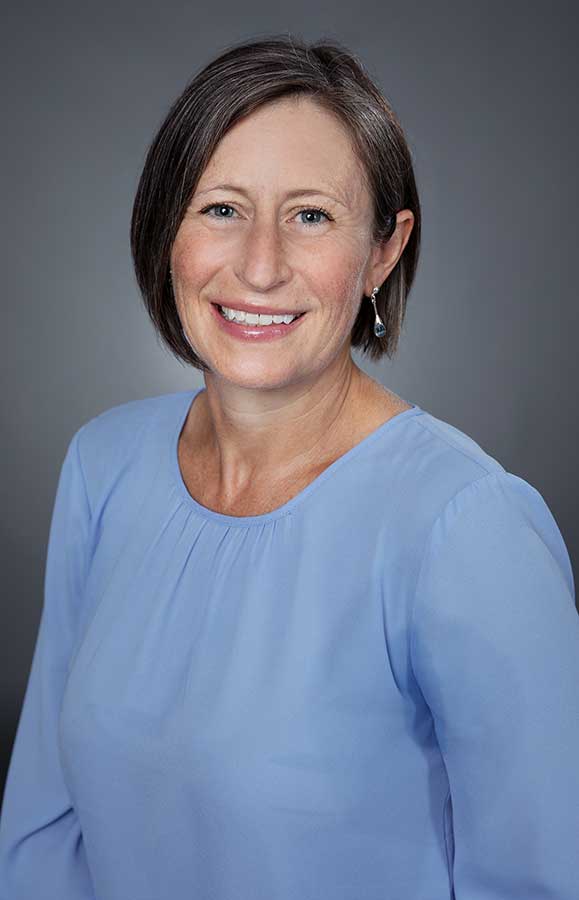
Katherine (Katie) McDonald, Ph.D., has been appointed Senior Associate Dean for Research and Administration in Falk College. As Senior Associate Dean, McDonald is responsible for the oversight of research, administration, and support for faculty; the supervision of the Falk College Office of Research Development; the development and implementation of Falk strategic initiatives; and representing Falk College on University-level committees as appropriate. The office reports directly to Falk College Dean Jeremy Jordan.
“Falk College research spans a wide range of disciplines with impactful, practical applications in individual health and community wellbeing,” Jordan says. “Thanks to Dr. McDonald’s leadership and her team in the Falk College Office of Research Development, the College has experienced steady growth in research activity by every measure, including grant funding, publishing, interdisciplinary collaborations, and student engagement. I am eager to see her influence expand as Senior Associate Dean for Research and Administration.”
McDonald’s new appointment follows a three-year appointment as Associate Dean of Research. During her tenure, McDonald worked collaboratively to establish programming to nurture faculty research, enhance connections on campus to fuel interdisciplinary research, and develop policy to foster research success.
“I am delighted to continue to serve Falk College in this new role,” says McDonald. “Falk College is home to students, staff, and faculty committed to creating and leveraging scientific discoveries to enhance human thriving. It is an honor to have the opportunity to work with so many talented people to co-chart our future.”
McDonald is a professor in the Falk College Department of Public Health, where she also served as chair from 2018 to 2020. She is a fellow of the American Association on Intellectual and Developmental Disabilities, chair of Syracuse University’s Institutional Review Board, and a member of the Editorial Board for Autism in Adulthood. At Syracuse University, she holds faculty affiliations in the Aging Studies Institute, the Burton Blatt Institute, the Consortium for Culture and Medicine, and the Disability Studies program.
As a scholar, McDonald uses socioecological theory and community-engaged research to understand and promote the inclusion of individuals with disabilities. She has made significant contributions to research in disability, health disparities, community-engaged research, and ethical, legal, and social issues in research. Her research has been supported by grant funding from the National Institutes of Health, U.S. Department of Education, the National Institute on Disability, Independent Living, Rehabilitation Research, and the Patient Centered Outcomes Institute, among others. She is published in leading journals such as the Disability and Health Journal, American Journal of Bioethics, and the American Journal on Intellectual and Developmental Disabilities.
She received a B.S. with distinction in human development and family studies with a minor in French from Cornell University and a Ph.D. in community and prevention research psychology with a minor in statistics, methods, and measurements from the University of Illinois at Chicago.
‘Same Playing Field’
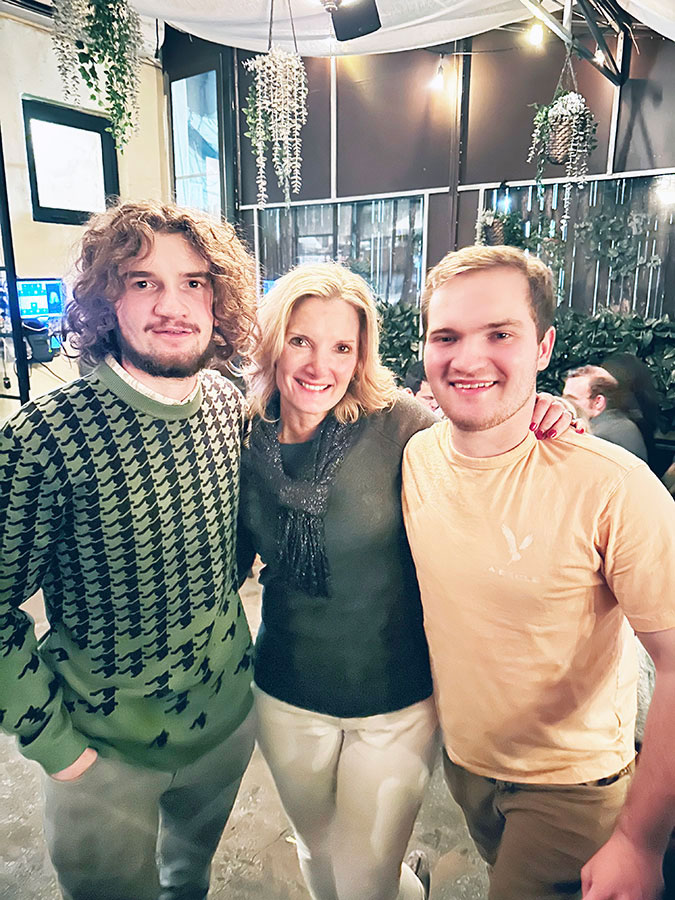
After David Sobczak ’23 enrolled at Syracuse University, he gravitated toward social work and helping others because of the time he had spent in hospitals as a child with cerebral palsy.
“He was in and out of the hospital for extended periods of time, and what he saw were a lot of kids who were in the hospital and literally no one ever came to see them,” says Dee Anna Sobczak, David’s mother. “With his family and friends, David was never alone, and we would embrace kids that were there and bring them into our circle. He realized then and there that he’s very lucky to have a support group and not everybody has that.”
Sobczak wanted to be a football coach, and he earned his undergraduate degree from the School of Social Work in the Falk College of Sport and Human Dynamics because a football team, like society, is made up of people from all walks of life. He wanted to learn how to best communicate with the players, show empathy for their individual situations, and build trust–the building blocks of social work.
Sobczak spent four seasons as offensive student assistant coach for the Syracuse football team, and he recently completed his first season as an offensive assistant coach for the University of Akron. Meanwhile, Sobczak’s younger brother, Danny, played football in high school and he and David told their mother that in both high school and college, many of the student-athletes struggled to pay for day-to-day items.
“What we found is that a lot of the students who were part of the team were on scholarship, but they weren’t funded for school supplies, their computer–all the things that would have set them up to be just as successful as their peers,’’ Dee Anna Sobczak says. “Many of the kids didn’t even have the money to buy lunch.”
As a result of those conversations, Dee Anna, David, and Danny, who graduated from the University of Colorado Boulder last spring, decided to create a fund to help Falk College students who are experiencing financial hardship. Working with Director of Development Megan Myers, who will become Falk’s assistant dean of advancement March 1, they created the Sobczak Family Student Support Endowed Fund that provides mini grants for an academic year.
“A lot of times, these students are trying to fight their way out of whatever situation they came from and start a new life for themselves,” Dee Anna Sobczak says. “This (fund) is to help set them up to be as successful as their peers, and that way everybody is on the same playing field as much as they can be.”
The mini grants are available to meet a wide range of needs and provide access to opportunities. Categories of support include emergency basic needs, fees, and supplies associated with the student’s educational program, and other critical student and human needs. Mini grants range from $100 to $300.
The Sobczak Family Fund is open to graduate and undergraduate students from the following Falk College programs: Exercise Science, Human Development and Family Science, Marriage and Family Therapy, Nutrition and Food Studies, Public Health, and Social Work. In the types of needs it addresses, the fund mirrors the Brandon S. Steiner Sport Management Student Support Fund for students enrolled in Falk’s Department of Sport Management.
Students may apply for assistance from the Sobczak Family Student Support Fund by filling out this application form and including documentation/information about circumstance. A student can’t be awarded funding more than twice.
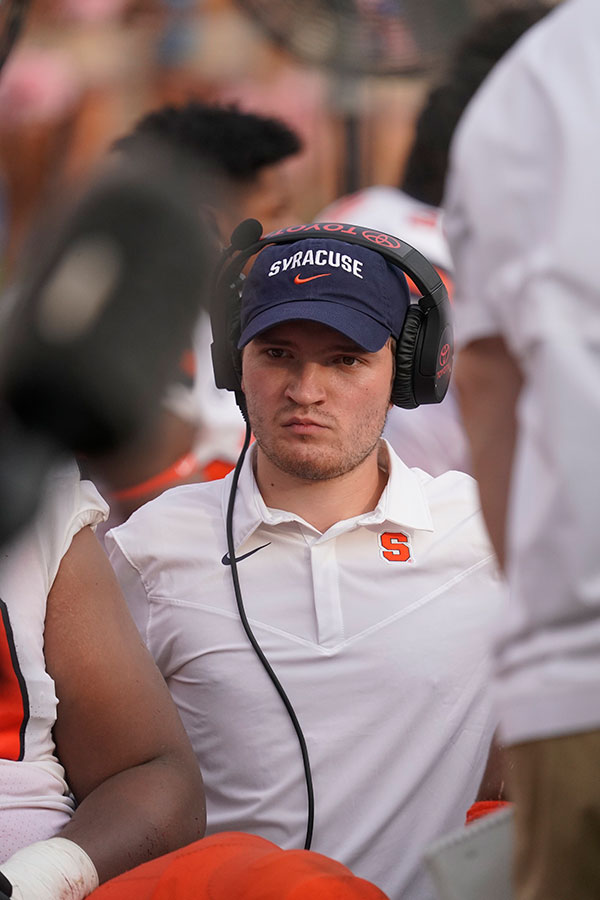
David Sobczak’s disability is physical, and his challenges are there for all to see. But what his Social Work education taught him and his family is that we don’t know everything that might be going on in a person’s life, and the family fund is for students whose challenges may not be so obvious.
“There are really special people in Social Work,” David Sobczak said in a fall 2022 interview. “When it comes to my career and where it helps me, I’m going to encounter–and I’ve already encountered–people with tough situations in their family lives and you’ve got to be there for them.
“So, you learn about empathy, how to deal with people, and how to communicate, and you also learn that we’re all people,” he added. “You treat people as people and that’s a life skill that will take you further than any education can ever take you.”
In that interview for a feature story that appeared before Syracuse’s bowl game in 2022, David talked about wanting to give back and serve as a role model for those with disabilities who have dreams of their own. The family fund for Falk Students, Dee Anna Sobczak says, is to help students overcome outside challenges to complete their education and realize their dreams.
“We want them to be the best version of themselves they can be, figure out who they want to be and what they want to do, and put a path together to get there,” Dee Anna says. “And also, to realize that nothing is impossible; if you can dream it, you can do it.”
In addition to the Sobczak Family Student Support Endowed Fund, there are other opportunities and awards available to students in Falk College. Please visit the Awards and Scholarships page on the Falk website for more information on how to apply.
About Forever Orange: The Campaign for Syracuse University
Orange isn’t just our color. It’s our promise to leave the world better than we found it. Forever Orange: The Campaign for Syracuse University is poised to do just that. Fueled by more than 150 years of fearless firsts, together we can enhance academic excellence, transform the student experience, and expand unique opportunities for learning and growth. Forever Orange endeavors to raise $1.5 billion in philanthropic support, inspire 125,000 individual donors to participate in the campaign, and actively engage one in five alumni in the life of the University. Now is the time to show the world what Orange can do. Visit foreverorange.syr.edu to learn more.
Page 5 of 31
